Whatever the initials, Audi’s SQ5 is an SUV winner
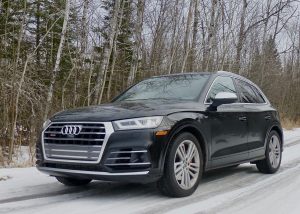
Redesigned Audi Q5 is roomy without bulk and adds the sportier SQ5 with 354 horsepower and 369 foot-pounds of torque from its turbo V6.
By John Gilbert
If you get confused by the model designations of various auto manufacturers, you can always rely on Germany’s Audi operation to assure us that the numbers still matter. You can move up the sedan models from smallest to largest by going A3, A4, A5, A6, A7, and A8, and the same holds true for the always changing fleet of SUVs, which are set off with a “Q,” as in Q3, Q5, Q7, and soon to be introduced Q8.
The Q7 is the traditional largest Audi SUV, and it underwent a significant change for 2017, with a fold-down third row seat and either a turbocharged 2.0-liter 4-cylinder or a supercharged 3.0-liter V6 that could bring the larger vehicle to life.
For 2018, Audi has redone the midsize Q5, which is pretty much the perfect compromise in size between those wanting to downsize from the larger SUVs on the market, and still might want to stay larger than the suddenly abundant smaller compact crossovers.
I recently had the chance to spend a week with a Q5, but it wasn’t just a Q5, it was Audi’s pleasantly upgraded sportier model, called the SQ5. In this case, the full name was SQ5 3.0T quattro tiptronic. Incidentally, Audi offers the “S” packages on all levels of cars and SUVs. Not that adding an S alleviates the alphabet soup of meaningful designations, but it does correctly imply sporty upgrades.
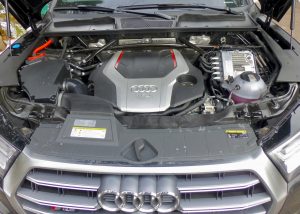
Switching from supercharging to turbocharging doesn’t restrict power, as the SQ5’s 354/369 power/torque numbers indicate.
Last time I had the chance to engage Audi engineers and marketing whizzes, I challenged them for varying from the trend to call their turbocharged engines with a “T” designation, and now were calling the 3.0 supercharged V6 a 3.0T. They shrugged it off as though I was being too particular, and pointed out that their countrymen at Mercedes and BMW had abandoned the precision of having the letters and numbers all make sense.
Now that I’ve had the chance to drive the new SQ5, it occurs to me that perhaps Audi was just running up a diversion for a few years until it could revise its engines. Instead of renaming the engine with an “S,” it instead redid the 3.0 V6 with a turbocharger instead of supercharger.
The difference is more than just subtle. A supercharger is driven by a belt off the alternator, designed to blow an extra high charge of air into the intake, which sucks in more gas and provides a hard increase in horsepower. A turbocharger is a turbine-driven device that does almost the same thing, but it gathers up its power from siphoning off some exhaust gases that would be heading out the tailpipes, and using that current of air to spin the turbine wheel and blow in the higher charge of air, and thus air-fuel mixture.
The major difference is that there is an inherent hesitation under brisk acceleration while the turbo “spools up” to speed. Modern technology has gone a long way toward eliminating the turbo lag, to the point it’s pretty unnoticeable.
So Audi, which used turbocharging before most of its competitors on cars and SUVs, apparently has veered away from the supercharger to the turbocharger in the new SQ5, which might be easier coordinated with the engine-management computer.
All I can say is the turbocharged 3.0 provided quick takeoffs and smooth passing power. The 3.0-turbo delivers 354 horsepower and a whopping 369 foot-pounds of torque in the new SQ5, through an 8-speed automatic that shifts smoothly, or can be manually shifted by steering-wheel paddles.
For comparison purposes, the supercharged 3.0 in the Q7 provides 333 horsepower and 325 foot-pounds of torque in the larger, 7-passenger vehicle, but it is interesting that the turbo offers more power and torque than the supercharged engine, allowing the SQ5 to get to 60 in more than a second less than the same engine in the Q7.
Both the Q5 and Q7 also offer the choice of a potent 2.0-liter 4, both with 252 horsepower and 273 foot-pounds of torque. For my money, the 4 would be more than adequate and could get you about 28 miles per gallon, compared to the 24 mpg maximum I attained in the SQ5.
The redesign makes the new SQ5 lower and sleeker that its predecessor, and it looked sleeker still in its Mythos Black Metallic sheet metal, set off with a stunning Magma Red leather interior with the S Package. One of the signature features of all Audis in recent years is their massive, 6-sided grilles. On some vehicles they are attractive, and on others just plain imposing. On the SQ5, the whole front end is lower than it used to be, so the big grille becomes something of a horizontal take on a vertical shape. I like it.
The SQ5 has a sticker price of $54,300, equipped with all the usual technology and safety features such as stabilization control, and comfort items like heated seats. Digging into the option bin for the S-Sport, Prestige, and Driver assistance packages, the sticker price rises to $68,750. That gives you 21-inch alloy wheels with high-performance all-season Pirelli tires, head-up display, dual-pane acoustic glass, Band & Olufsen 3D sound system, the navigation system, Nappa leather interior, and adaptive air suspension.
The nav system itself is an amazing feature. It comes on the large dash screen, and you can switch it around to view a flat map, a 3D map, or a Google Earth view of your surroundings taken from actual satellite camera work.
In addition, you look at the instrument panel and see a large circular gauge with an analog tachometer with a digital speedometer readout in the middle. Or, you can summon up two circular gauges, one for speedometer and the other with a tachometer and other information. But if you click the button for “View,” the gauges are diminished in size and split wider apart, while the entire width of the instrument panel becomes a view of the territory ahead.
Using the Google Earth view on the instrument panel, then parking at my home in the rural area outside of Duluth, Minnesota, I could wind in for a close-up view that actually showed a satellite photo of my house, and garage, located in the midst of some thick woods. Amazing
The electronic stabilization control has your choice of settings that completely change the personality of the SQ5. You can click lift/offroad, Allroad, Comfort, Auto, Dynamic, or Individual, and get ride firmness and power changes to suit every taste.
Audi’s array of LED lights is another special feature. Not only the headlights and driving lights, but taillights too, including a very neat LED underline under the taillights. If you happen to turn on the 4-way flashers, the rear end turns into a very creative light show.
I spotted a disabled car on a divided 4-lane highway near Duluth, and the car barely made it onto the left turn lane. I stopped behind the car, turned on my hazard flashers, and checked to find the guy was out of gas. A pickup truck came along and pulled in to stop behind me, and when I told the driver it was OK, he said: “Those are great tail-lights on that Audi.”
We ended up standing there, safely out of traffic, discussing the features of the car. “I can’t believe how neat those lights are,” he said. “Is there an Audi dealer in Duluth?”
I told him there wasn’t, but the Twin Cities dealers are only a couple hours away. He said, “Well, if there was a dealer here, I’d buy one of those.”
Maybe Audi could fit a mini-dealership into the double left-turn lane of the highway.



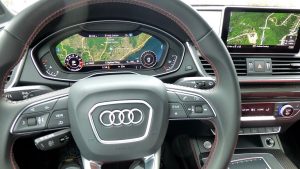
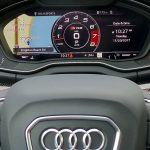
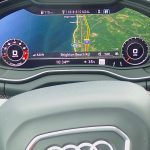

 John Gilbert is a lifetime Minnesotan and career journalist, specializing in cars and sports during and since spending 30 years at the Minneapolis Tribune, now the Star Tribune. More recently, he has continued translating the high-tech world of autos and sharing his passionate insights as a freelance writer/photographer/broadcaster. A member of the prestigious North American Car and Truck of the Year jury since 1993. John can be heard Monday-Friday from 9-11am on 610 KDAL(www.kdal610.com) on the "John Gilbert Show," and writes a column in the Duluth Reader.
John Gilbert is a lifetime Minnesotan and career journalist, specializing in cars and sports during and since spending 30 years at the Minneapolis Tribune, now the Star Tribune. More recently, he has continued translating the high-tech world of autos and sharing his passionate insights as a freelance writer/photographer/broadcaster. A member of the prestigious North American Car and Truck of the Year jury since 1993. John can be heard Monday-Friday from 9-11am on 610 KDAL(www.kdal610.com) on the "John Gilbert Show," and writes a column in the Duluth Reader.